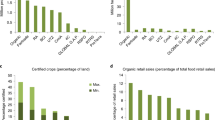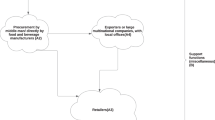Abstract
Global food supply chains remain critical drivers of ecosystem degradation and social injustices. In this Perspective we invite policymakers, civil society actors, businesses and researchers to direct attention to the middle of global supply chains, where various actors—referred to as ‘midstream actors’—operate between agricultural commodity producers and manufacturers of food products. We highlight the power of this less visible segment (spanning multinational trading houses to small-scale aggregators of commodities) and the potential leverage that can be harnessed to improve supply chain and food system sustainability. Not engaging these actors poses a risk to the impact of supply chain policy.
This is a preview of subscription content, access via your institution
Access options
Access Nature and 54 other Nature Portfolio journals
Get Nature+, our best-value online-access subscription
$29.99 / 30 days
cancel any time
Subscribe to this journal
Receive 12 digital issues and online access to articles
$119.00 per year
only $9.92 per issue
Buy this article
- Purchase on Springer Link
- Instant access to full article PDF
Prices may be subject to local taxes which are calculated during checkout



Similar content being viewed by others
References
Pendrill, F. et al. Disentangling the numbers behind agriculture-driven tropical deforestation. Science 377, eabm9267 (2022).
Lambin, E. F. et al. The role of supply-chain initiatives in reducing deforestation. Nat. Clim. Change 8, 109 (2018).
Waarts, Y. R. et al. Multiple pathways towards achieving a living income for different types of smallholder tree-crop commodity farmers. Food Secur. 13, 1467–1496 (2021).
Adams, M. A. & Carodenuto, S. Stakeholder perspectives on cocoa’s living income differential and sustainability trade-offs in Ghana. World Dev. 165, 106201 (2023).
Busquet, M., Bosma, N. & Hummels, H. A multidimensional perspective on child labor in the value chain: the case of the cocoa value chain in West Africa. World Dev. 146, 105601 (2021).
Sellare, J. et al. Six research priorities to support corporate due-diligence policies. Nature 606, 861–863 (2022).
Desiderio, E., García-Herrero, L., Hall, D., Segrè, A. & Vittuari, M. Social sustainability tools and indicators for the food supply chain: a systematic literature review. Sustain. Prod. Consum. 30, 527–540 (2022).
Galford, G. L. et al. Agricultural development addresses food loss and waste while reducing greenhouse gas emissions. Sci. Total Environ. 699, 134318 (2020).
Schilling-Vacaflor, A. & Lenschow, A. Hardening foreign corporate accountability through mandatory due diligence in the European Union? New trends and persisting challenges. Regul. Gov. 17, 677–693 (2023).
Weihrauch, D., Carodenuto, S. & Leipold, S. From voluntary to mandatory corporate accountability: the politics of the German Supply Chain Due Diligence Act. Regul. Gov. 17, 909–926 (2023).
Bueno, N. & Kaufmann, C. The Swiss human rights due diligence legislation: between law and politics. Bus. Hum. Rights J. 6, 542–549 (2021).
Evans, A. Overcoming the global despondency trap: strengthening corporate accountability in supply chains. Rev. Int. Polit. Econ. 27, 658–685 (2020).
Brewer, E. Closed loophole: investigating forced labor in corporate supply chains following the repeal of the consumptive demand exception. Kans. J. Law Public Policy 28, 86–112 (2018).
Plouffe-Malette, K. & Brisson, H. Forced labour and trade: a Canada–United States comparative analysis. Eur. Rev. Int. Stud. 6, 84–100 (2019).
Nolan, J. & Bott, G. Global supply chains and human rights: spotlight on forced labour and modern slavery practices. Aust. J. Hum. Rights 24, 44–69 (2018).
Renier, C. et al. Transparency, traceability and deforestation in the Ivorian cocoa supply chain. Environ. Res. Lett. 18, 024030 (2023).
Gardner, T. A. et al. Transparency and sustainability in global commodity supply chains. World Dev. 121, 163–177 (2019).
Grabs, J., Cammelli, F., Levy, S. A. & Garrett, R. D. Designing effective and equitable zero-deforestation supply chain policies. Glob. Environ. Change 70, 102357 (2021).
Reardon, T. The hidden middle: the quiet revolution in the midstream of agrifood value chains in developing countries. Oxf. Rev. Econ. Policy 31, 45–63 (2015).
Reardon, T. & Minten, B. in Agricultural Development: New Perspectives in a Changing World (eds Otsuka, K. & Fan, S.) 397–437 (International Food Policy Research Institute, 2021).
Reardon, T., Liverpool-Tasie, L. S. O. & Minten, B. Quiet revolution by SMEs in the midstream of value chains in developing regions: wholesale markets, wholesalers, logistics, and processing. Food Secur. 13, 1577–1594 (2021).
Berning, L. & Sotirov, M. Hardening corporate accountability in commodity supply chains under the European Union Deforestation Regulation. Regul. Gov. 17, 870–890 (2023).
Silverman, S., Carodenuto, S. & Grabs, J. Adventures in Transdisciplinary Translation: Co-creating and Vetting a Novel Research Agenda on Trading Companies as Sustainability Governance Actors (Sage Publications, 2023); https://doi.org/10.4135/9781529628371
Grabs, J. & Carodenuto, S. L. Traders as sustainability governance actors in global food supply chains: a research agenda. Bus. Strategy Environ. 30, 1314–1332 (2021).
Baines, J. & Hager, S. B. Commodity traders in a storm: financialization, corporate power and ecological crisis. Rev. Int. Polit. Econ. 29, 1053–1084 (2022).
Koutsouris, A. Exploring the emerging intermediation roles (facilitation and brokerage) in agricultural extension education. Int. J. Agric. Ext. 21–37 (2014).
Serdijn, M., Kolk, A. & Fransen, L. Uncovering missing links in global value chain research—and implications for corporate social responsibility and international business. Crit. Perspect. Int. Bus. 17, 619–636 (2020).
Kingsman, J. C. Out of the Shadows: The New Merchants of Grain (Independently published, 2019).
Cao, Y. & Mohiuddin, M. Sustainable emerging country agro-food supply chains: fresh vegetable price formation mechanisms in rural China. Sustainability 11, 2814 (2019).
Legun, K. & Bell, M. M. The second middle: conducers and the agrifood economy. J. Rural Stud. 48, 104–114 (2016).
Schoonhoven-Speijer, M. & Vellema, S. How institutions governing the economic middle in food provisioning are reinforced: the case of an agri-food cluster in northern Uganda. J. Rural Stud. 80, 34–44 (2020).
Reinecke, J., Donaghey, J., Wilkinson, A. & Wood, G. Global supply chains and social relations at work: brokering across boundaries. Hum. Relat. 71, 459–480 (2018).
Quiñones-Ruiz, X. F. Social brokerage: encounters between Colombian coffee producers and Austrian buyers—a research-based relational pathway. Geoforum 123, 107–116 (2021).
Clapp, J. ABCD and beyond: from grain merchants to agricultural value chain managers. Can. Food Stud. 2, 126–135 (2015).
Carodenuto, S. & Buluran, M. The effect of supply chain position on zero-deforestation commitments: evidence from the cocoa industry. J. Environ. Policy Plan. 23, 716–731 (2021).
Bager, S. L. & Lambin, E. F. Sustainability strategies by companies in the global coffee sector. Bus. Strategy Environ. 29, 3555–3570 (2020).
Cargill: Still The Worst (Mighty Earth, 2023).
Norström, A. V. et al. Principles for knowledge co-production in sustainability research. Nat. Sustain. 3, 182–190 (2020).
Bennett, E. A. & Grabs, J. How can sustainable business models distribute value more equitably in global value chains? Introducing “value chain profit sharing” as an emerging alternative to fair trade, direct trade, or solidarity trade. Bus. Ethics Environ. Responsib. (in the press).
Davies, I. A. & Doherty, B. Balancing a hybrid business model: the search for equilibrium at Cafédirect. J. Bus. Ethics 157, 1043–1066 (2019).
zu Ermgassen, E. K. H. J. et al. Addressing indirect sourcing in zero deforestation commodity supply chains. Sci. Adv. 8, eabn3132 (2022).
Middendorp, R. S., Boever, O., Rueda, X. & Lambin, E. F. Improving smallholder livelihoods and ecosystems through direct trade relations: high-quality cocoa producers in Ecuador. Bus. Strategy Dev. 3, 165–184 (2020).
Holland, E., Kjeldsen, C. & Kerndrup, S. Coordinating quality practices in Direct Trade coffee. J. Cult. Econ. 9, 186–196 (2016).
Borrella, I., Mataix, C. & Carrasco-Gallego, R. Smallholder farmers in the speciality coffee industry: opportunities, constraints and the businesses that are making it possible. IDS Bull. 46, 29–44 (2015).
Ogahara, Z., Jespersen, K., Theilade, I. & Nielsen, M. R. Review of smallholder palm oil sustainability reveals limited positive impacts and identifies key implementation and knowledge gaps. Land Use Policy 120, 106258 (2022).
Hidayat, N. K., Offermans, A. & Glasbergen, P. Sustainable palm oil as a public responsibility? On the governance capacity of Indonesian Standard for Sustainable Palm Oil (ISPO). Agric. Hum. Values 35, 223–242 (2018).
dos Reis, T. N. P. et al. Understanding the stickiness of commodity supply chains is key to improving their sustainability. One Earth 3, 100–115 (2020).
Grabs, J. & Garrett, R. D. Goal-based private sustainability governance and its paradoxes in the Indonesian palm oil sector. J. Bus. Ethics https://doi.org/10.1007/s10551-023-05377-1 (2023).
Claassen, R. & Gerbrandy, A. Doing good together: competition law and the political legitimacy of interfirm cooperation. Bus. Ethics Q. 28, 401–425 (2018).
Boshoven, J. et al. Jurisdictional sourcing: leveraging commodity supply chains to reduce tropical deforestation at scale. A generic theory of change for a conservation strategy, v 1.0. Conserv. Sci. Pract. 3, e383 (2021).
von Essen, M. & Lambin, E. F. Jurisdictional approaches to sustainable resource use. Front. Ecol. Environ. 19, 159–167 (2021).
Dallas, M. P., Ponte, S. & Sturgeon, T. J. Power in global value chains. Rev. Int. Polit. Econ. 26, 666–694 (2019).
Dauvergne, P. Is the power of brand-focused activism rising? The case of tropical deforestation. J. Environ. Dev. 26, 135–155 (2017).
McCullough, E. B. & Matson, P. A. Evolution of the knowledge system for agricultural development in the Yaqui Valley, Sonora, Mexico. Proc. Natl Acad. Sci. USA 113, 4609–4614 (2016).
Carodenuto, S. Governance of zero deforestation cocoa in West Africa: new forms of public–private interaction. Environ. Policy Gov. 29, 55–66 (2019).
Sayogo, D. S. et al. Challenges and requirements for developing data architecture supporting integration of sustainable supply chains. Inf. Technol. Manag. 16, 5–18 (2015).
Hamm, M. W., Mueller, A., Riemer, O. & Merrigan, K. True Cost Accounting and Dietary Patterns: A Strategy for Transformative Food Systems (TMG – Think Tank for Sustainability, 2022).
Lafarre, A. The proposed Corporate Sustainability Due Diligence Directive: corporate liability design for social harms. Eur. Bus. Law Rev. 34, 213–240 (2023).
Specialty Coffee Transaction Guide (Goizueta Business School, 2024); https://www.transactionguide.coffee/data
Acknowledgements
We extend our gratitude for the shared insights and knowledge offered by all participants in this overarching project, including Antonin, N. Adubofour, T. Agyarko-Kwarteng, T. Bartley, R. Besong, B. Cashore, K. Cavallin, B. Cisneros, C. Cutler, P. Dauvergne, S. Dieng Ndeye, T. Dietz, C. Ehrensperger, L. Fransen, B. Guyton, K. Halle, L. Kamphuis, J. Kehoe, T. Kodjane, E. Lambin, S. Ng, K. Nolte Ferguson, C. Ortiz, J.-A. Ponce, S. Ponte, P. Schleifer, M. Serdijn, V. Semelkova, M. Tampe, O. Tichit and M. Wong. We also gratefully acknowledge the financial support from the University of Victoria and its Centre for Global Studies, as well as the Social Science and Humanities Research Council of Canada, who supported this project via an SSHRC Connection Grant.
Author information
Authors and Affiliations
Contributions
Conceptualization was by J.G. and S.C. Methodology was by S.C., J.G. and S.S. Investigation was by J.G., S.C., K.J., M.A.A., M.A.C., G.C., A.C., J.D., E.K.H.J.z.E., R.D.G., J.L.-W., M.M., E.S., S.S. and I.N. Writing (original draft) was by J.G. and S.C. Writing (review and editing) was by K.J., M.A.A., M.A.C., G.C., A.C., J.D., E.K.H.J.z.E., R.D.G., J.L.-W., M.M., I.N. and S.S. Visualization was by J.G. Funding acquisition was by S.C. and J.G.
Corresponding authors
Ethics declarations
Competing interests
The authors declare no competing interests.
Peer review
Peer review information
Nature Sustainability thanks Eugenia Rosca, Ruerd Ruben and the other, anonymous, reviewer(s) for their contribution to the peer review of this work.
Additional information
Publisher’s note Springer Nature remains neutral with regard to jurisdictional claims in published maps and institutional affiliations.
Rights and permissions
Springer Nature or its licensor (e.g. a society or other partner) holds exclusive rights to this article under a publishing agreement with the author(s) or other rightsholder(s); author self-archiving of the accepted manuscript version of this article is solely governed by the terms of such publishing agreement and applicable law.
About this article
Cite this article
Grabs, J., Carodenuto, S., Jespersen, K. et al. The role of midstream actors in advancing the sustainability of agri-food supply chains. Nat Sustain (2024). https://doi.org/10.1038/s41893-024-01296-9
Received:
Accepted:
Published:
DOI: https://doi.org/10.1038/s41893-024-01296-9



